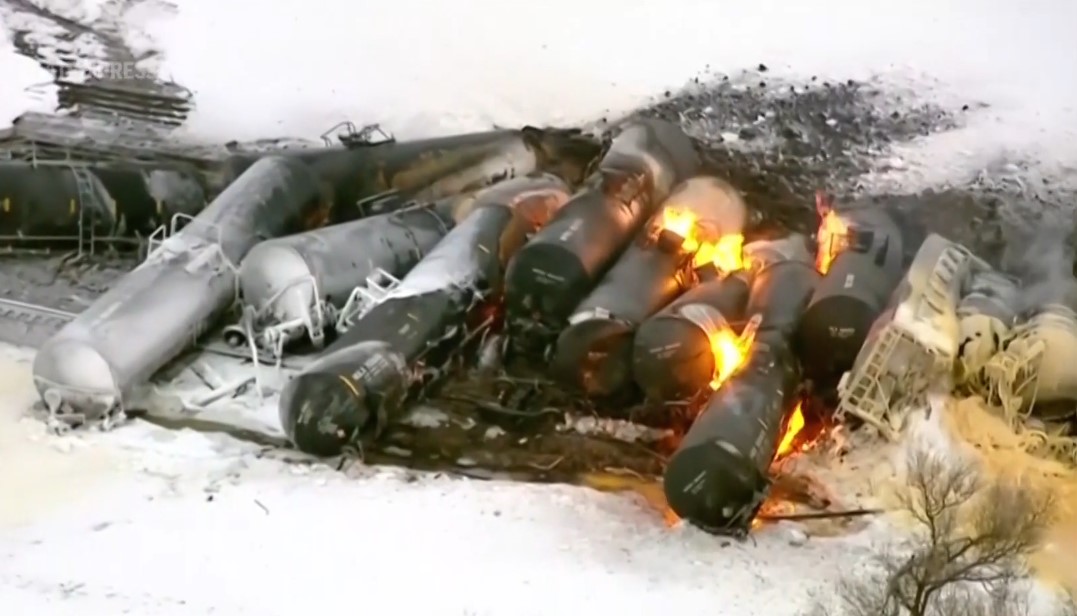
PRINSBURG, Minn. (AP) — Hundreds of people had to evacuate their Minnesota hometown after a train hauling ethanol and corn syrup derailed and caught fire early Thursday, but authorities are hopeful that the quick response and cold weather will help limit the impact of this latest crash.
Still, those pushing to improve rail safety said Thursday’s derailment only adds urgency to the debate over reforms Congress and regulators are considering even as officials seemed to apply some of the lessons learned after last month’s fiery derailment near East Palestine, Ohio.
Minnesota officials said the BNSF train derailed around 1 a.m. Thursday in the town of Raymond, roughly 100 miles (161 kilometers) west of Minneapolis. That prompted the evacuation of essentially all of the town’s 250 homes because they were within 1/2 mile (0.8 kilometers) of the derailment. The evacuation order was lifted around noon.
Click here for the full article
|
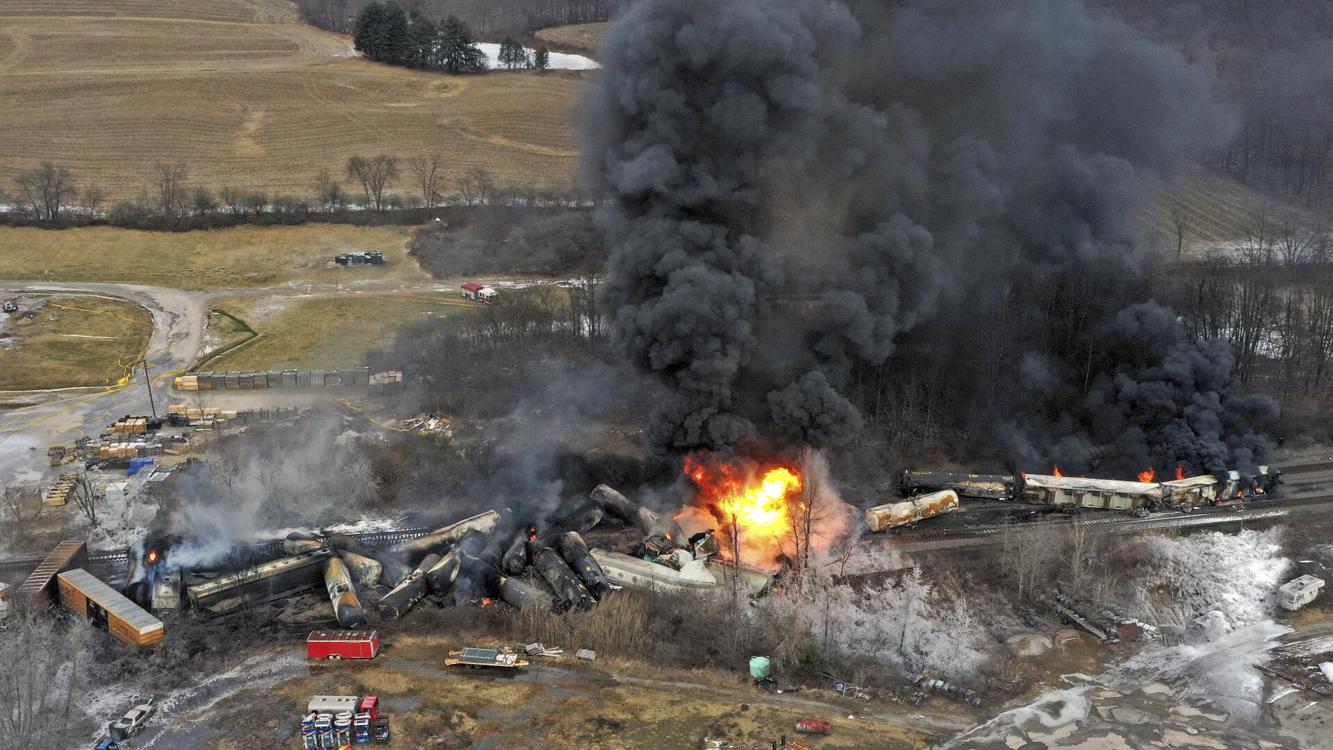
The next derailment ‘could be cataclysmic’ if action isn’t taken after the incident near the Ohio-Pennsylvania border, says expert
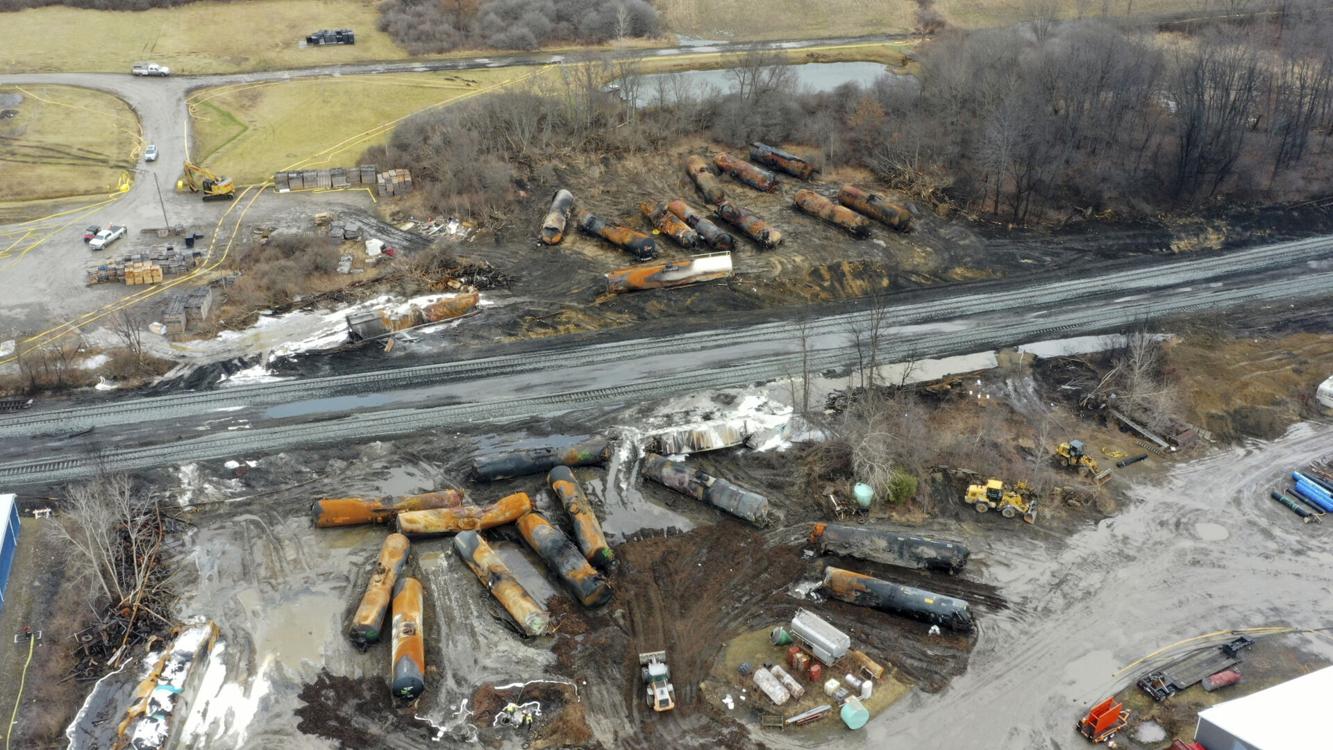
Five days after a train carrying vinyl chloride derailed and exploded near the Ohio-Pennsylvania border, crews ignited a controlled burn of toxic chemicals to prevent a much more dangerous explosion.
Thousands in East Palestine, a town of about 5,000 people, evacuated, and officials warned the controlled burn would create a phosgene and hydrogen chloride plume across the region. Phosgene is a highly toxic gas that can cause vomiting and breathing trouble, and was used as a weapon in the first world war.
Click here for the full article
|
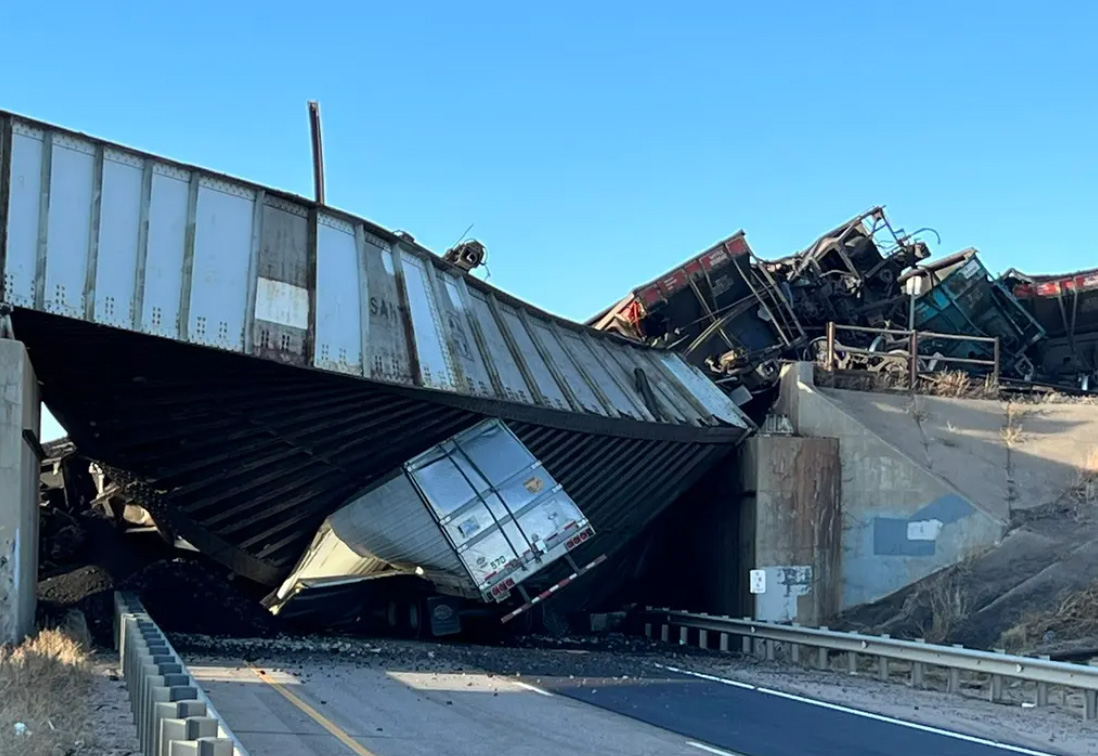
Interstate 25 is closed indefinitely in both directions just north of Pueblo after a BNSF Railway train carrying coal derailed Sunday afternoon, spilling its freight onto the highway. One semi-truck driver was killed in the crash, according to the Associated Press.
Click here for the full article
|
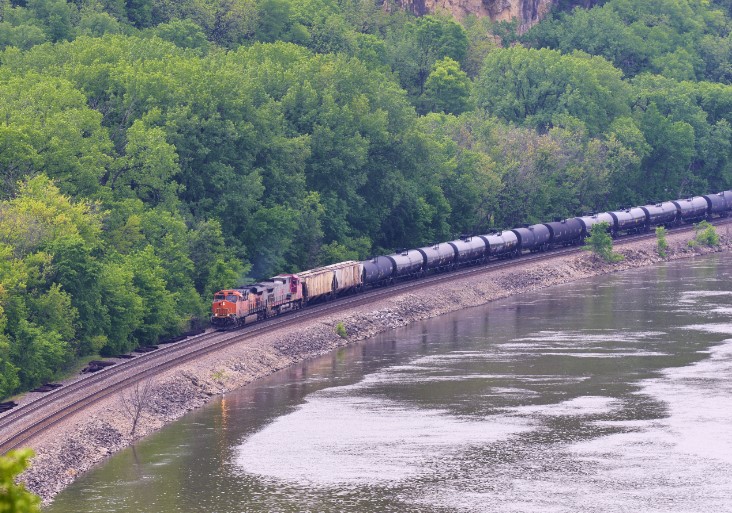
Rail incidents such as derailments and collisions can have serious impacts in terms of loss of life and damage to equipment and infrastructure. When the rail incident involves hazardous materials (HAZMAT), the consequences can be even more severe.
PHMSA, in collaboration with FRA, asked the U.S. DOT Volpe Center to analyze an additional potential impact from HAZMAT rail incidents that was not well understood: the impact on rail operations in terms of delay and associated emissions resulting from a closure.
To develop a method to estimate delay, the U.S. DOT Volpe Center team synthesized a variety of data sources, including the Surface Transportation Board confidential waybill sample data, and utilized various transportation modeling techniques. PHMSA asked for the U.S. DOT Volpe Center’s expertise in this area based on similar support provided to FMCSA to estimate environmental and delay costs from truck crashes.
The U.S. DOT Volpe Center delivered a final report to PHMSA in October 2023. The report indicates that in the U.S., approximately 27 rail incidents per year result in the release of HAZMAT with an estimated cost of delay and additional emissions of $3.3 million annually. On average, there are an additional nine rail-related HAZMAT releases that are not associated with a rail incident, which result in a cost of approximately $260,000 dollars each year.
These findings can be used to support policy and regulatory decision-making related to transporting HAZMAT by rail. Further, the estimation method developed by the U.S. DOT Volpe Center could potentially be used to evaluate costs of rail delay for a variety of purposes including the benefits of improving rail infrastructure or preventing other types of rail incidents, not just HAZMAT rail incidents.
The U.S. DOT Volpe Center’s multidisciplinary team included economists, geographic information system specialists, and subject matter experts on passenger rail and vehicle emissions. The team modeled the various factors that impact the cost of delay: freight rail volumes, passenger rail volumes, track capacity, the marginal impact of the presence of HAZMAT on the duration of closure, train congestion, locomotive emission rate, train crew costs, equipment costs, passengers per train, fuel costs, and the social costs of emissions. The U.S. DOT Volpe Center combined the various model components to produce estimates for a variety of scenarios covering various locations on the U.S. freight rail network.
|
The U.S. DOT Volpe Center delivered a final report to PHMSA in October 2023. The report indicates that in the U.S., approximately 27 rail incidents per year result in the release of HAZMAT with an estimated cost of delay and additional emissions of $3.3 million annually. On average, there are an additional nine rail-related HAZMAT releases that are not associated with a rail incident, which result in a cost of approximately $260,000 dollars each year.
|
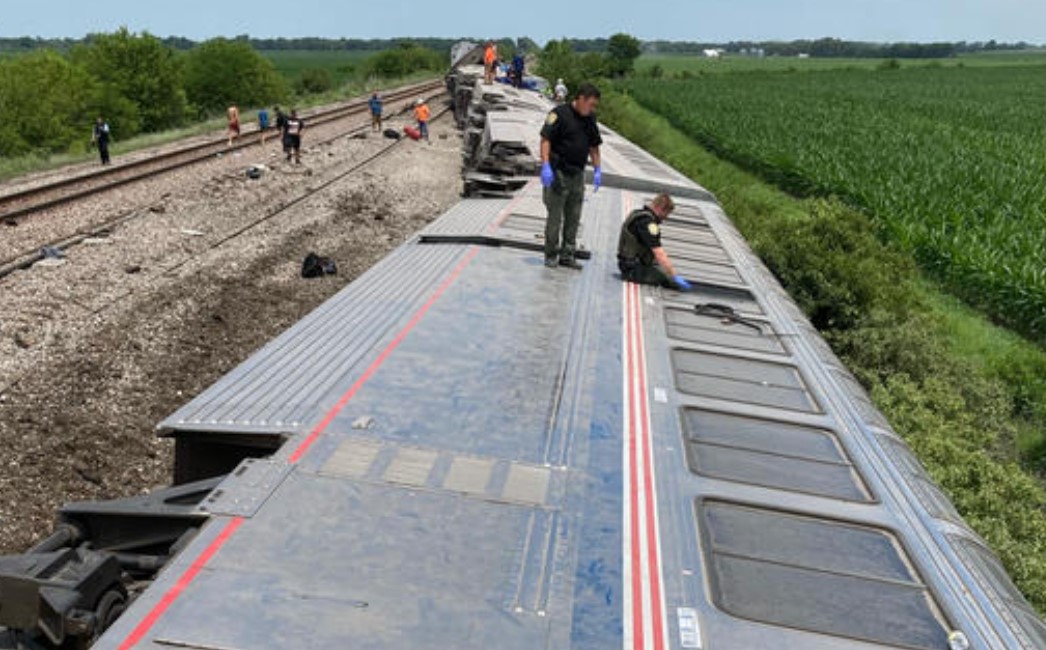
U.S. At least 4 dead, dozens injured after Amtrak train derails in Missouri By Zoe Christen Jones Updated on: June 29, 2022 / 6:58 PM EDT / CBS News At least four people were killed Monday after an Amtrak train hit a dump truck and derailed in Missouri, officials said. It's not yet clear how many were injured, though ten hospitals received patients.
Click here for the full article
|
|
An Amtrak train traveling from New York to Miami hit stationary freight train early Sunday, killing at least two people and injuring at least 116 others.
https://www.nytimes.com/2018/02/04/us/amtrak-crash-south-carolina.html
|
|
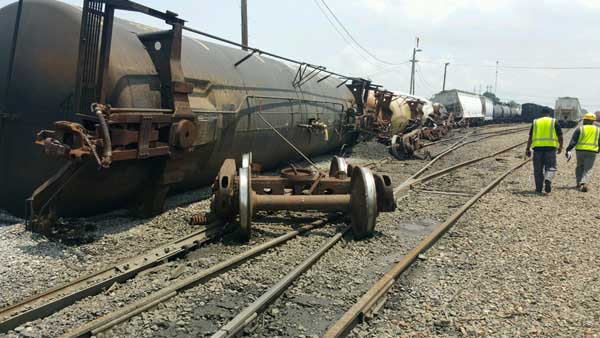 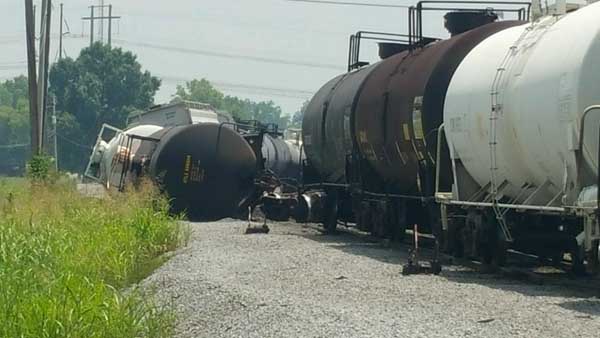
Courtesy: Addis Police Department
ADDIS, LA – On May 19, 2015, Officials with West Baton Rouge Parish reported a mandatory evacuation and shelter in place issued as a precaution after a train derailment in Addis has been lifted. The order was lifted around 1:15 a.m. All residents were allowed to return to their homes. Originally, the evacuation order went into effect at 7 p.m.
Four chemical tankers derailed in Addis around 1:30 p.m. Tuesday. Officials ordered the evacuation of Acadian Crossing and Sunset neighborhoods, as well as areas within 1,000 feet from the derailment site. Officials said the four Union Pacific cars were en route to Livonia. The train was moving slowly at the time of the derailment. Union Pacific officials won't know the cause of the derailment until they move the tankers and inspect the tracks.
Louisiana State Police, Department of Environmental Quality and Union Pacific all responded to the scene to inspect the tankers. The chemicals on the train are sodium hydroxide, propylene oxide, propylene dichloride and nitrogen blanket purge. Sodium hydroxide, also known as lye and caustic soda, is an inorganic compound. Propylene oxide is an organic compound used for the production polyurethane plastics.
Propylene dichloride is an organic compound classified as a chlorocarbon. It is a colorless, flammable liquid with a sweet garlic odor. It is obtained as a byproduct of the production of epichlorohydrin, which is produced on a large scale. In contact with water, epichlorohydrin hydrolyzes to 3-MCPD, a carcinogen found in food. It is also used as a solvent for resins, and paints, and it has found use as an insect fumigant.
The Addis Police Department is investigating the derailment, along with the assistance of the West Baton Rouge Parish Sheriff's Office.
Officials said the evacuation was a precaution, in the event something would happen when crews turned the train cars back upright. Officers with the Addis Police Department went door-to-door to inform residents of the evacuation and to assist.
|
Union Pacific Railroad ordered to pay $100K to worker who was retaliated against for reporting injury
An OSHA investigation has determined that management of the Union Pacific Railroad added insult to injury to a worker in Roseville, Calif., who was hurt on-the-job by retaliating against him for reporting his injury in February 2011.
Investigators established that Union Pacific action violated the Federal Railroad Safety Act. As a result, OSHA has ordered the railroad to pay the worker $100,000 in punitive and compensatory damages. For more information, see the news release.
This case follows a pattern of behavior by Union Pacific toward its injured employees. OSHA recently reported that the railroad has faced more than 200 whistleblower complaints nationwide since 2001.
OSHA enforces the whistleblower* provisions of the FRSA and 21 other statutes protecting employees who report violations of various industries. Detailed information about OSHA's Whistleblower Protection Program and employee whistleblower rights is available at www.whistleblowers.gov.
|
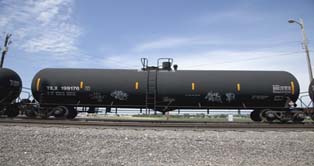
A DOT-111 rail tanker travels through Council Bluff Iowa
The growing number of older rail cars used by the oil industry has prompted calls for safety upgrades from many organizations and agencies. Philadelphia is experiencing a major boom in the oil industry, and has become one of busiest crude-by-rail shipment sources in the U.S. Federal regulators with the U.S. Department of Transportation (DOT) are delaying the release of final regulations for older freight-rail tank cars transporting ethanol and crude oil. The rules will be released May 12 instead of March 31st as was originally planned.
This comes after many railroad industry groups warned in public comments that the proposed phase-out of DOT-111 tankers carrying Class 1 flammable materials by October 2017 and a phase-out of those carrying Class 2 liquids by October 2018 will lead to shortages of tank cars. Federal officials late last year received more than 3,400 public comments on an array of proposals aimed at safer transportation of crude oil by rail. They include a new design for tank cars, retrofitting existing tank cars, installing new braking systems and speed restrictions.
In a joint filing, the Association of American Railroads (AAR) and the American Petroleum Institute (API) contend the tank car industry doesn’t have the capacity to retrofit the estimated 143,000 tank cars that would need to be modernized to meet the new specifications. They say manufacturers could not build new tank cars fast enough.
About 70 percent of crude oil shipped to refineries from the Bakken Shale Formation in North Dakota and Montana — and 70 percent of ethanol shipped to refineries — is transported by rail, according to the American Fuel and Petrochemical Manufacturers, a trade group representing 120 U.S. refineries.
As a State Impact analysis from Pennsylvania has previously reported, Bakken oil has helped breathe new life into Philadelphia’s refineries, but the city has also become one of the nation’s most heavily traveled regions for rail oil shipments. A string of recent accidents has prompted calls for safety upgrades.
For further information go to:
https://www.aar.org/
http://www.afpm.org/default.aspx
http://www.api.org/
|

